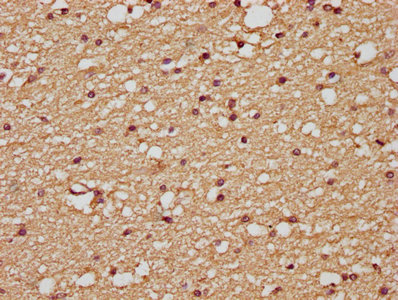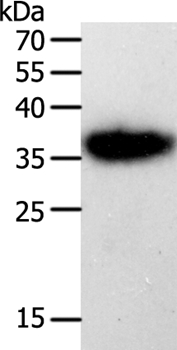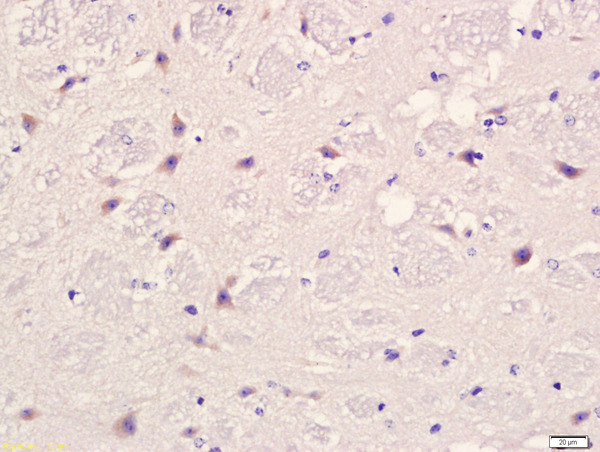![Wild-type (WT) and PLAUR knockout (KO) HeLa cell extracts (30 μg) were separated by 12% SDS-PAGE, and the membrane was blotted with uPAR antibody [HL2398] (GTX638615) diluted at 1:500. The HRP-conjugated anti-rabbit IgG antibody (GTX213110-01) was used to detect the primary antibody. Wild-type (WT) and PLAUR knockout (KO) HeLa cell extracts (30 μg) were separated by 12% SDS-PAGE, and the membrane was blotted with uPAR antibody [HL2398] (GTX638615) diluted at 1:500. The HRP-conjugated anti-rabbit IgG antibody (GTX213110-01) was used to detect the primary antibody.](https://www.genetex.com/upload/website/prouct_img/normal/GTX638615/GTX638615_T-45054_20230630_WB_KO_watermark_23062718_340.webp)
Wild-type (WT) and PLAUR knockout (KO) HeLa cell extracts (30 μg) were separated by 12% SDS-PAGE, and the membrane was blotted with uPAR antibody [HL2398] (GTX638615) diluted at 1:500. The HRP-conjugated anti-rabbit IgG antibody (GTX213110-01) was used to detect the primary antibody.
uPAR antibody [HL2398]
GTX638615
ApplicationsWestern Blot, ImmunoHistoChemistry, ImmunoHistoChemistry Paraffin
Product group Antibodies
ReactivityHuman, Mouse
TargetPLAUR
Overview
- SupplierGeneTex
- Product NameuPAR antibody [HL2398]
- Delivery Days Customer9
- Application Supplier NoteWB: 1:500-1:3000. *Optimal dilutions/concentrations should be determined by the researcher.Not tested in other applications.
- ApplicationsWestern Blot, ImmunoHistoChemistry, ImmunoHistoChemistry Paraffin
- CertificationResearch Use Only
- ClonalityMonoclonal
- Clone IDHL2398
- Concentration1 mg/ml
- ConjugateUnconjugated
- Gene ID5329
- Target namePLAUR
- Target descriptionplasminogen activator, urokinase receptor
- Target synonymsCD87, U-PAR, UPAR, URKR, urokinase plasminogen activator surface receptor, monocyte activation antigen Mo3, u-plasminogen activator receptor form 2, urokinase-type plasminogen activator (uPA) receptor
- HostRabbit
- IsotypeIgG
- Protein IDQ03405
- Protein NameUrokinase plasminogen activator surface receptor
- Scientific DescriptionThis gene encodes the receptor for urokinase plasminogen activator and, given its role in localizing and promoting plasmin formation, likely influences many normal and pathological processes related to cell-surface plasminogen activation and localized degradation of the extracellular matrix. It binds both the proprotein and mature forms of urokinase plasminogen activator and permits the activation of the receptor-bound pro-enzyme by plasmin. The protein lacks transmembrane or cytoplasmic domains and may be anchored to the plasma membrane by a glycosyl-phosphatidylinositol (GPI) moiety following cleavage of the nascent polypeptide near its carboxy-terminus. However, a soluble protein is also produced in some cell types. Alternative splicing results in multiple transcript variants encoding different isoforms. The proprotein experiences several post-translational cleavage reactions that have not yet been fully defined. [provided by RefSeq, Jul 2008]
- ReactivityHuman, Mouse
- Storage Instruction-20°C or -80°C,2°C to 8°C
- UNSPSC41116161

![Untreated (–) and treated (+) U937 whole cell extracts (30 μg) were separated by 12% SDS-PAGE, and the membrane was blotted with uPAR antibody [HL2398] (GTX638615) diluted at 1:250. The HRP-conjugated anti-rabbit IgG antibody (GTX213110-01) was used to detect the primary antibody. Untreated (–) and treated (+) U937 whole cell extracts (30 μg) were separated by 12% SDS-PAGE, and the membrane was blotted with uPAR antibody [HL2398] (GTX638615) diluted at 1:250. The HRP-conjugated anti-rabbit IgG antibody (GTX213110-01) was used to detect the primary antibody.](https://www.genetex.com/upload/website/prouct_img/normal/GTX638615/GTX638615_45138_20230818_WB_treatment_PMA_23082201_284.webp)
![uPAR antibody [HL2398] detects uPAR protein at cell membrane by immunohistochemical analysis. Sample: Paraffin-embedded human lung cancer. uPAR stained by uPAR antibody [HL2398] (GTX638615) diluted at 1:100. Antigen Retrieval: Citrate buffer, pH 6.0, 15 min uPAR antibody [HL2398] detects uPAR protein at cell membrane by immunohistochemical analysis. Sample: Paraffin-embedded human lung cancer. uPAR stained by uPAR antibody [HL2398] (GTX638615) diluted at 1:100. Antigen Retrieval: Citrate buffer, pH 6.0, 15 min](https://www.genetex.com/upload/website/prouct_img/normal/GTX638615/GTX638615_T-45054_20230928_IHC-P_23102401_134.webp)
![uPAR antibody [HL2398] detects uPAR protein by immunohistochemical analysis. Sample: Paraffin-embedded mouse tissues. uPAR stained by uPAR antibody [HL2398] (GTX638615) diluted at 1:100. Antigen Retrieval: Citrate buffer, pH 6.0, 15 min uPAR antibody [HL2398] detects uPAR protein by immunohistochemical analysis. Sample: Paraffin-embedded mouse tissues. uPAR stained by uPAR antibody [HL2398] (GTX638615) diluted at 1:100. Antigen Retrieval: Citrate buffer, pH 6.0, 15 min](https://www.genetex.com/upload/website/prouct_img/normal/GTX638615/GTX638615_T-45054_20230928_IHC-P_multiple_M_23102401_285.webp)








![uPAR antibody [HL2169] detects uPAR protein at cell membrane and cytoplasmic vesicles by immunofluorescent analysis. Sample: U937 cells were fixed in 4% paraformaldehyde at RT for 15 min. Green: uPAR stained by uPAR antibody [HL2169] (GTX638173) diluted at 1:500. Blue: Fluoroshield with DAPI (GTX30920).](https://www.genetex.com/upload/website/prouct_img/normal/GTX638173/GTX638173_T-44935_20230714_ICC_IF_23072519_823.webp)